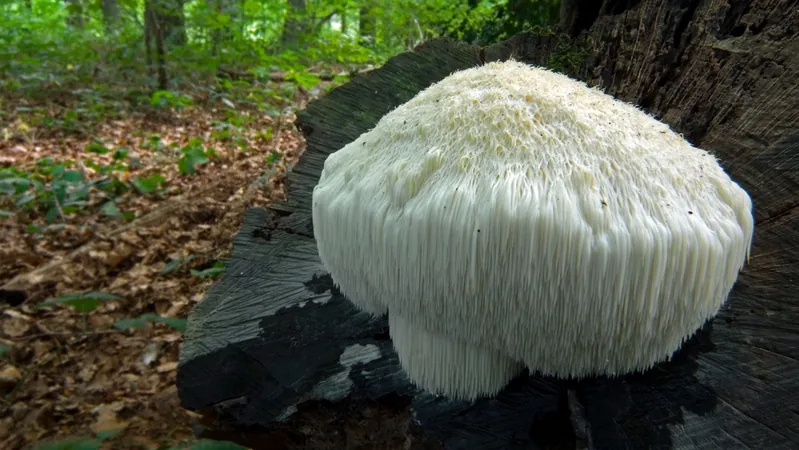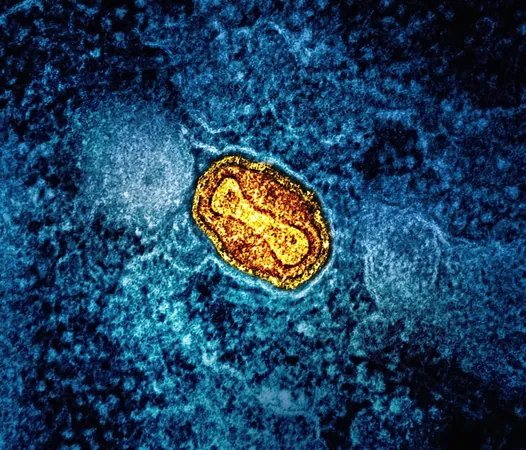
The Revolutionary Potential of Psilocybin: A New Approach to Mental Health
2024-10-12
Author: Jacob
Introduction
As the conversation surrounding psilocybin mushrooms continues to evolve, it’s time to move beyond casual terminology. Renowned mycologist Paul Stamets emphasizes the need for a more mature discourse. “These are no longer ‘shrooms’ meant for parties. Psilocybin mushrooms are non-addictive, potentially life-altering substances,” he stated in a recent interview.
Clinical Trials and Breakthroughs
New clinical trials are revealing promising insights; just a couple of doses of psilocybin in controlled therapeutic environments have led to profound, long-lasting results for individuals with treatment-resistant major depressive disorder, a condition that often proves unresponsive to conventional antidepressants. This has prompted the U.S. Food and Drug Administration to categorize psilocybin as a breakthrough therapy, and as Stamets put it, “That’s phenomenal.”
Therapeutic Potential
The psychoactive compound psilocybin is converted in the body to psilocin, which holds immense potential not just for depression, but also for alleviating anxiety, cluster headaches, anorexia, obsessive-compulsive disorder, and various addiction issues. Neurologist Richard Isaacson from Florida Atlantic University remarked, “The data are strong, spanning from depression to PTSD to cluster headaches, one of the most agonizing conditions I know.”
How Psychedelics Work
Historically, classic psychedelics like psilocybin have been shown to bind to serotonin receptors in the brain, which play a vital role in regulating mood, sleep, and other bodily functions. Individuals grappling with depression often experience low serotonin levels. Conventional treatments, like SSRIs (selective serotonin reuptake inhibitors), can remedy this, but results may take time and are not guaranteed.
In contrast, psychedelics provide almost immediate changes in neural connectivity, evidenced by research conducted by pharmacologist Brian Roth at the University of North Carolina. Studies have indicated that psilocybin leads to a greater synchronization among brain regions that don’t typically connect, thereby creating a state of 'altered consciousness.' This altered state is crucial to the therapeutic process, as it helps diminish the cycles of negative thought patterns common in depression.
Cognitive Flexibility and Neuroplasticity
David Nutt, at Imperial College London, elaborated, “Psychedelics disrupt the self-critical loops of depressed patients, allowing for new perspectives and solutions to emerge during a trip.” This disruption facilitates greater cognitive flexibility, which Nutt believes is why psilocybin serves as an effective treatment for depression.
Psychedelics also contribute to neuroplasticity—the brain's ability to reorganize itself by forming new neural connections. The unique dendritic growth fostered by psychedelics not only builds new pathways but strengthens positive thought patterns over time. Unlike traditional SSRIs, which have failed to demonstrate significant increases in brain connectivity compared to psilocybin, these insights now align with patient testimonials that highlight significant changes post-therapy.
Long-term Effects and Microdosing
While taking psychedelics isn’t a universal solution, those who find success often report a transformative emotional experience. However, research continues on how to sustain these benefits. Harvard University scientists found that some patients showed improvements even eight years later after one-dose sessions, but for many, symptoms gradually recurred over several months.
For individuals wishing to prolong the positive effects, microdosing—taking smaller amounts of a psychedelic regularly—has gained traction. Stamets believes this technique helps maintain mental clarity and emotional health. His approach includes 'stacking' microdoses with substances like niacin and Lion’s Mane mushroom extract, which he claims amplifies psilocybin's potential benefits. However, more scientifically controlled studies on microdosing are necessary, as previous research has provided mixed results.
Risks and Considerations
It's important to note while the potential of psychedelics is enormous, they are not without risks. Not everyone is suitable for psychedelic therapy, particularly those on SSRIs or those with a personal or family history of psychotic disorders. Frederick Barrett from Johns Hopkins University cautioned that for some, psychedelics could trigger latent mental health conditions.
The Future of Psychedelics in Mental Health
In light of the mounting evidence linking psilocybin with mental health improvements, what the future holds is cautiously optimistic. Researchers like Roth strive to synthesize new medications that harness the benefits of psychedelics while minimizing side effects. 'Imagine a pill that alleviates depression or anxiety overnight without the associated psychedelic experience,' Roth mused.
The exploration into psilocybin and other psychedelics is certainly a groundbreaking frontier in mental health treatment, unlocking new pathways for healing and self-discovery that may redefine how we understand and approach mental wellness.









 Brasil (PT)
Brasil (PT)
 Canada (EN)
Canada (EN)
 Chile (ES)
Chile (ES)
 España (ES)
España (ES)
 France (FR)
France (FR)
 Hong Kong (EN)
Hong Kong (EN)
 Italia (IT)
Italia (IT)
 日本 (JA)
日本 (JA)
 Magyarország (HU)
Magyarország (HU)
 Norge (NO)
Norge (NO)
 Polska (PL)
Polska (PL)
 Schweiz (DE)
Schweiz (DE)
 Singapore (EN)
Singapore (EN)
 Sverige (SV)
Sverige (SV)
 Suomi (FI)
Suomi (FI)
 Türkiye (TR)
Türkiye (TR)